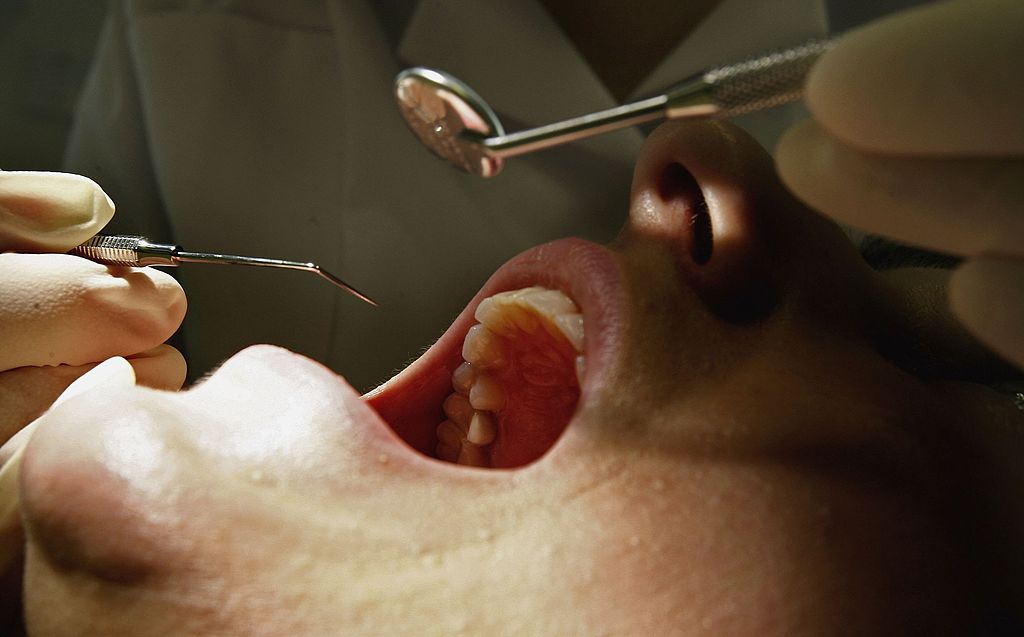This drug might help teeth repair their own cavities

A drug designed to treat Alzheimer's disease could also be the key to cutting back on trips to the dentist for dreaded cavity fillings. In a study published in the journal Scientific Reports, scientists revealed the drug, called tideglusib, has been found to "stimulate the tooth to create new dentine capable of filling in large cavities," The Independent reported.
Teeth naturally have the ability to repair small areas of damage, but scientists say this drug enhances that ability, making it possible for "the tooth's own cells to rebuild cavities extending from the surface to the root," The Guardian said. All dentists would have to do, scientists suggest, is prep the tooth the same as they would for a filling, then insert a biodegradable sponge soaked in the drug into the tooth, which would then be sealed up. After a few weeks, the sponge would degrade and the cavity would be filled in by dentine.
Before you get too excited about saying sayonara to fillings, note that this is far from a done deal. Scientists have successfully tested the technique in mice teeth, but they're not yet entirely certain it will work on human teeth, which are much larger and thus tend to have much larger cavities.
The Week
Escape your echo chamber. Get the facts behind the news, plus analysis from multiple perspectives.

Sign up for The Week's Free Newsletters
From our morning news briefing to a weekly Good News Newsletter, get the best of The Week delivered directly to your inbox.
From our morning news briefing to a weekly Good News Newsletter, get the best of The Week delivered directly to your inbox.
A free daily email with the biggest news stories of the day – and the best features from TheWeek.com
-
 Sudan stands on the brink of another national schism
Sudan stands on the brink of another national schismThe Explainer With tens of thousands dead and millions displaced, one of Africa’s most severe outbreaks of sectarian violence is poised to take a dramatic turn for the worse
-
 ‘Not every social scourge is an act of war’
‘Not every social scourge is an act of war’Instant Opinion Opinion, comment and editorials of the day
-
 The Louvre’s security measures are in hot water after a major heist
The Louvre’s security measures are in hot water after a major heistIn the Spotlight Millions of dollars in jewels were stolen from the museum
-
 Gaza ceasefire teeters as Netanyahu orders strikes
Gaza ceasefire teeters as Netanyahu orders strikesSpeed Read Israel accused Hamas of firing on Israeli troops
-
 Argentina’s Milei buoyed by regional election wins
Argentina’s Milei buoyed by regional election winsSpeed Read Argentine President Javier Milei is an ally of President Trump, receiving billions of dollars in backing from his administration
-
 Proposed Trump-Putin talks in Budapest on hold
Proposed Trump-Putin talks in Budapest on holdSpeed Read Trump apparently has no concrete plans to meet with Putin for Ukraine peace talks
-
 Bolivia elects centrist over far-right presidential rival
Bolivia elects centrist over far-right presidential rivalSpeed Read Relative political unknown Rodrigo Paz, a centrist senator, was elected president
-
 Madagascar president in hiding, refuses to resign
Madagascar president in hiding, refuses to resignSpeed Read Andry Rajoelina fled the country amid Gen Z protests and unrest
-
 Sanae Takaichi: Japan’s Iron Lady set to be the country’s first woman prime minister
Sanae Takaichi: Japan’s Iron Lady set to be the country’s first woman prime ministerIn the Spotlight Takaichi is a member of Japan’s conservative, nationalist Liberal Democratic Party
-
 Israel, Hamas agree to first step of Trump peace plan
Israel, Hamas agree to first step of Trump peace planSpeed Read Israel’s military pulls back in Gaza amid prisoner exchange
-
 Israel intercepts 2nd Gaza aid flotilla in a week
Israel intercepts 2nd Gaza aid flotilla in a weekSpeed Read The Israeli military intercepted a flotilla of nine boats with 145 activists aboard along with medical and food aid